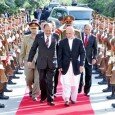By Kunwar Khuldune Shahid –
As Pakistan bows down before US pressure, hopes with TAPI revive
Petroleum Minister Shahid Khaqan Abbasi has confirmed reports that Pakistan’s gas important dynamics with Iran would be undergoing a slight tweak. Iran would be converting natural gas into LNG, which would be transported to Pakistan through Oman’s terminal facility.
Seemingly Islamabad has finally accepted the fate of the Iran-Pakistan (IP) pipeline – as a pipedream that buckled under the duress of the American sanctions and price incompatibility.
Alternatives
Importing compressed natural gas would obviously increase the cost of Iranian gas from the already steep $14 per MMBtu. While Oman has made the most of Pakistan’s dillydallying over IP, by signing a $60 billion agreement to import Iranian gas for the next quarter of a century, Pakistan has mulled LNG from Qatar as an alternative throughout 2014. At $18/MMBtu that’s another expensive alternative.
The deal between Elengy Terminal Pakistan Limited (ETPL) and Port Qasim Authority (PQA) over the construction of the LNG terminal also points towards Islamabad having earmarked LNG import as the go-to play to enhance the current 4.47 bcfd gas production, which would be slashed by 50% in the next five years if gas isn’t injected into the system.
Even so, there’s another alternative in the pipeline.
Enter TAPI
Advisor to the Prime Minister on Foreign Affairs, Sartaj Aziz was in Ashgabat on September 12, discussing the practical implementation of the project that for long has been the carrot to distract Pakistan away from IP. Aziz’s rendezvous with Turkmen president Gurbanguly Berdimuhamedov was one of a string of meetings with representatives from the project member states of the Turkmenistan-Afghanistan-Pakistan-India (TAPI) pipeline, which included the then Afghan President Hamid Karzai and India’s foreign minister Sushma Swaraj.
Along with IP, and the optimistic 110-km India-Pakistan pipeline that was supposed to transfer LNG gas from Jalandhar to Wagah, TAPI has been a part of a troika of Pakistani pipedreams.
Déjà vu
While Iran-Pakistan pipeline had US sanctions, India-Pakistan pipeline had the usual distrust and paranoia, the main reason why TAPI has been procrastinated on is the question of security – the Afghan question.
TAPI is a virtual doppelganger of Baku-Tbilisi-Ceyhan (BTC) pipeline, with identical lengths (1,750 km), Caspian origin and the support of a global bank (ADB in TAPI’s case). More crucially the two share similar problems, which of course have virtually identical solutions.
What Afghanistan is for TAPI, Azerbaijan was for BTC circa 2002. The BTC stakeholders gathered support of oil and gas companies that in turn played a pivotal role in ensuring the security of the region. With energy behemoths like Chevron and ExxonMobil having expressed their interest, there are few better ways of enhancing the security of TAPI than signing deals with these companies.
That is exactly what is being deliberated over in Ashgabat.
Chicken and egg
Projects like TAPI ensure regional security, since every single stakeholder in the pipeline simultaneously becomes a guarantor of the venture. However, you need something bordering on a secure environment to start the project in the first place. TAPI, the biggest benefactors of which would be India and Pakistan, has been the victim of this ‘chicken and egg’ like situation.
Islamabad and New Delhi have long been traversing a similar ‘chicken and egg’ situation. They need bilateral trust to sanction such projects, while it is precisely these projects that would build the aforementioned trust. And with India and Pakistan getting 84% of the 33 billion cubic feet of gas annually (42% each, with 16% going to Afghanistan), TAPI would resolve their respective energy shortfalls and diplomatic tussles simultaneously.
Afghan Question
The same is true for Kabul and Islamabad as well. Their respective ‘chicken and egg’ question is owing to distrust involved in trade and terrorism. With Ashraf Ghani kick-starting a new era of hope and optimism in Afghanistan, TAPI would go a long way in backing that optimism.
Since Afghan volatility has for so long been TAPI’s Achilles’ heel, once the oil firms take over the project, a bevy of job opportunities would spring up, providing Afghanistan the economic stability that it needs. Again, with so many stakeholders dependent on peace in Afghanistan, this could herald the revamp of Afghan economy and would clamp down on regional terrorism as well. And of course there is hardly anyone who has more to gain from peace in the North-Eastern part of Afghanistan, than Pakistan.
Powers that be
For the U.S., TAPI would challenge Russian energy dominance in Central Asia that has been a crucial blackmailing tool for Moscow vis-à-vis Europe. It would also be a more palatable alternative to IP, with the West still trying to keep the upper hand in the ongoing negotiations with Tehran with regards to its nuclear programme.
If Pakistan were to import LNG from Iran it would still provide Tehran the economic impetus to wiggle out of further sanctions on its nuclear programme. Through TAPI Pakistan could satiate its energy appetite, without providing Iran the fiscal muscle to defend against the West’s clout of sanctions.
The pipeline web
TAPI’s construction was supposed to begin at the start of 2015, but with collective procrastination of all stakeholders the schedule for the pipeline has had to be revisited. The agreement signed by the four countries in Ashgabat on July 8, and the ensuing meetings in mid-September seem to point towards the long overdue consensus that TAPI is the project that would link the region into a symbiotic web wherein energy security is established and trade flourishes.
Growing economies of Central Asia, coupled with India would link with the massive markets of Pakistan and Afghanistan, both of whom should witness a rise in direct investments following enhanced transit trade. And if TAPI gets the go-ahead an actual pipeline web incorporating IP, and another pipeline linking India and Pakistan, extending towards the Middle East and South East Asia on either flank, could result in the economic integration spawning most of Asia.
The economic integration, coupled with energy sufficiency, could transform the region’s security situation. TAPI could provide Pakistan a long-lasting solution to its multi-pronged energy crises, while simultaneously giving Islamabad a definitive counterterrorism strategy.































































































